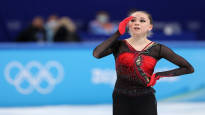Sports doctor from Lahti, Sergei Ilyukov, who was influential in the board of the Russian Anti-Doping Commission, considers Kamila Valieva’s four-year doping sentence justified.
The shocking news came in the middle of the Beijing Olympics on February 9, 2022. The media was informed that the Russian teenage star Kamila Valieva there were ambiguities in the doping sample. A couple of days later, the suspicion was confirmed.
The 15-year-old Valieva had given a positive doping sample at the Russian championships held on December 25, 2021. Trimetazidine, classified as a doping substance, was found in Valieva’s sample.
More than two years later, on Monday, January 29, 2024, Valieva received a verdict in her case. The International Court of Appeal for Sports, CAS, banned the skater for four years.
Sports doctor from Lahti Sergei Ilyukov was one of the experts in the trial organized by CAS in Lausanne at the end of last year. Ilyukov was part of the World Anti-Doping Agency’s Wada witness guard, which sentenced Valieva to a four-year doping penalty.
– The decision made does not contradict my views and expectations, says Ilyukov.
According to Valieva, trimetazidine had ended up in her system by accident. Valijeva said that she drank from a glass of water that had contained her grandfather’s heart medicine.
The case was handled in international court because there are big problems in Russia’s anti-doping activities. The country’s anti-doping agency, Rusada, has not been a full member of international anti-doping activities since 2015. At that time, an extensive state-led doping program was revealed in the country.
Wada has intervened in Rusada’s operations, among other things, by placing its own observer on Rusada’s board. Ilyukov took care of that post from the end of 2020 until Russia invaded Ukraine in February 2022.
Before Ilyukov’s resignation, an independent disciplinary body separate from the Rusada board cleared Valieva of the doping suspicion.
Wada found the decision of Rusada’s disciplinary board outrageous and challenged it in CAS.
Can you determine which factors influenced the decision of the Rusada Disciplinary Board?
– I can’t say it publicly, but you know, Ilyukov says, but refuses to elaborate on his position.
Appeal period of the month
CAS announced its decision on Valijeva on Monday, but the international sports community was still waiting for a detailed memorandum on the case.
According to Iljukov, CAS acted this way because Valieva has a month to challenge the case in the Swiss Supreme Court.
Ilyukov does not want to speculate whether the 17-year-old Valieva plans to appeal the CAS decision. Ilyukov is still silent about the more detailed reasons for the doping scandal.
– I cannot go into the details that have been considered in the trial. I can only go into them when a more detailed statement becomes public.
So far, it is known that, in addition to trimetazidine, hypoxene and L-carnitine have been found in Valieva’s doping sample. They have a performance-enhancing effect, but Wada has not yet added the substances in question to its list of prohibited substances.
According to Urheilu, a third substance was also found in Valieva’s sample, which has an anabolic effect on the athlete’s body. But just like in the cases mentioned above, Wada is only considering banning the substance.
Ilyukov refuses to comment on the information.
– We have to wait for a final, more thorough decision. It lists the ingredients.
Trimetazidine alone gives Wada the opportunity to impose a four-year ban on an athlete. CAS deemed Valieva’s offense worthy of the maximum sentence, although significantly lighter sentences have also been handed down for the substance to high-profile athletes.
Among other things, a top Chinese swimmer Sun Yang received a three-month suspension for trimetazidine ten years ago.
If Valieva’s doping conviction remains in effect, the Russian Olympic team will lose the team competition gold medal it won at the Beijing Olympics.
